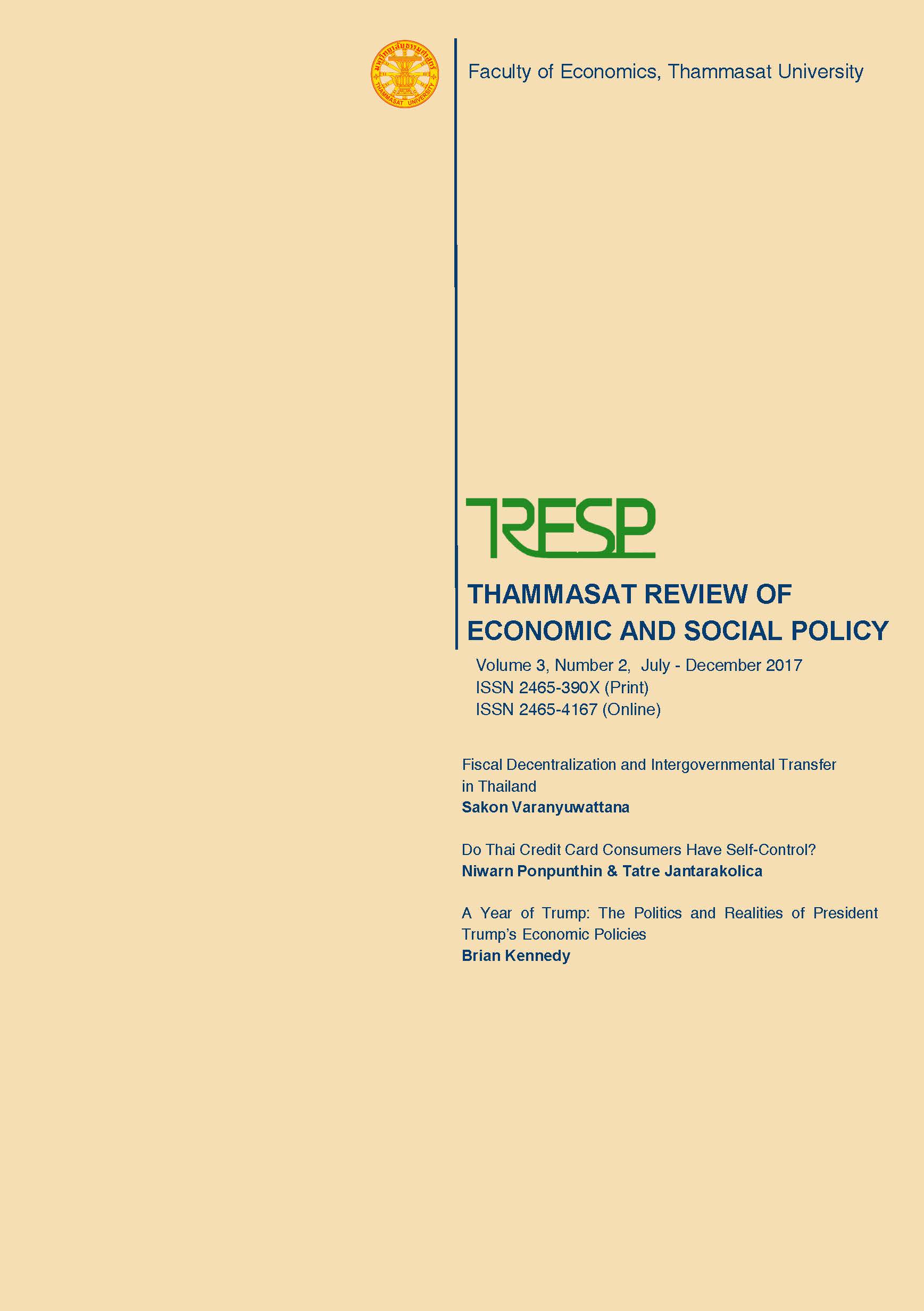Do Thai Credit Card Consumers Have Self-Control?
DOI:
https://doi.org/10.14456/tresp.2017.5References
Ando, A., & Modigliani, F. (1963). The life cycle hypothesis of saving: Aggregate implications and tests. American Economic Review, 53(1), 55-84.
Aphaiwongse, S. (1997). Impact of Credit Card Transaction on Bank Deposits (in Thai) (Unpublished Master’s thesis). Chulalongkorn University, Bangkok, Thailand.
Aramcharoen, S. (1996). Credit Card: the impact on demand for money (Unpublished Master’s thesis). Thammasat University, Bangkok, Thailand.
Baek, E., & Hong, G. (2004). Effect of family life-cycle stages on consumer debts. Journal of Family and Economic Issues, 25(3), 359-385.
Basnet, H. C., & Donou-Adonsou, F. (2016). Internet, consumer spending and credit card balance: Evidence from US consumers. Review of Financial Economics, 30, 11-22.
Bojanic, D. C. (1992). A Look at Modernized Family Life Cycle and Overseas Travel. Journal of Travel & Tourism Marketing, 1(1), 61-79.
Bryant, W. Keith. (1990). The Economic Organization of the Household. Cambridge: Cambridge University Press.
Chang, H., & Tucker-Ray, W. (2017, July 25). The Feedback Card: Real-Time Budgeting for Real People [Blog post]. Retrieved from http://www.ideas42.org/blog/feedbackcard-real-time-budgeting-real-people/
Chinaprayoon, C. (2003). Consumer Behavior and The Stickiness of Credit Card Interest Rates (in Thai) (Unpublished Master’s thesis). Chulalongkorn University, Bangkok, Thailand.
Crack, T. F., & Roberts, H. (2015). Credit card balances and repayment under competing minimum payment regimes. Review of Quantitative Finance and Accounting, 45(4), 785-801.
Gross, D. B., & Souleles, N. S. (2002). Do liquidity constraints and interest rates matter for consumer behavior? Evidence from credit card data. The Quarterly Journal of Economics, 117(1), 149-185.
Keawthong, P. (2008). Factors Affecting Delinquency of Credit Cards (in Thai) (Unpublished Master’s thesis). Chulalongkorn University, Bangkok, Thailand.
Kim, H., & DeVaney, A. S. (2001). The determinants of outstanding balance among credit card revolver. Financial Counseling and Planning, 12(1), 67-78.
Kitticharoonwit, P. (2016, October 5). What does credit card usage reveal about new consumption trends? Retrieved from https://www.scbeic.com/en/detail/product/2789
Mian, A., & Sufi, A. (2015). House of debt: How they (and you) caused the Great Recession, and how we can prevent it from happening again. University of Chicago Press.
Min, I., & Kim, J. H. (2003). Modeling credit card borrowing: A comparison of type I and type II Tobit approaches. Southern Economic Journal, 128- 143.
Muthitacharoen, A., Nuntramas, P., & Chotewattanakul, P. (2015). Rising Household Debt: Implications for Economic Stability. Thammasat Economic Journal, 67- 102.
Navarro-Martinez, D., Salisbury, L. C., Lemon, K. N., Stewart, N., Matthews, W. J., & Harris, A. J. L. (2011). Minimum required payment and supplemental information disclosure effects on consumer debt repayment decisions. Journal of Marketing Research, 48, 60-77.
Norvilitis, J. M., Szablicki, P. B., & Wilson, S. D. (2003). Factors influencing levels of credit-card debt in college students. Journal of applied social psychology, 33(5), 935-947.
Norvilitis, J. M., Merwin, M. M., Osberg, T. M., Roehling, P. V., Young, P., & Kamas, M. M. (2006). Personality factors, money attitudes, financial knowledge, and credit-card debt in college students. Journal of Applied Social Psychology, 36(6), 1395-1413.
Robb, C. A., & Sharpe, D. L. (2009). Effect of Personal Financial Knowledge on College Students’ Credit Card Behavior. Journal of Financial Counseling and Planning,20(1).
Seneerattanaprayul, J. (2007). The Credit Card Contract Under Asymmetric Information (Adverse Selection) (Unpublished Master’s thesis). Thammasat University, Bangkok, Thailand.
Stewart, N. (2009). The cost of anchoring on credit-card minimum repayments. Psychological Science, 20, 9- 41.
Thaler, R. H., & Shefrin, H. (1981). An Economic Theory of Self-Control. Journal of Political Economy, 89(2), 392-406.
Wang, L., Lu, W., & Malhotra, N. K. (2011). Demographics, attitude personality and credit card features correlate with credit card debt: A view from China. Journal of Economic Psychology, 32, 179-193.



